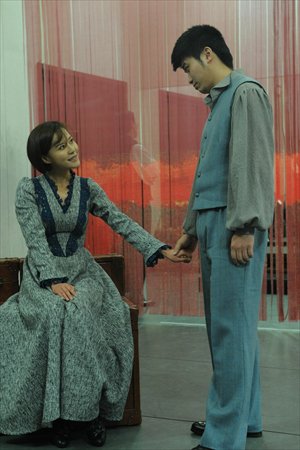Chekhov in love

Performers rehearse a scene from Love • Chekhov. Photo: Courtesy of Love • Chekhov
The romantic dalliances of famous playwrights such as Shakespeare has long been an appealing topic of discussion among fans of literature. The love life of Russian playwright Anton Chekhov (1860-1904), one of the most reputed playwrights in the world, is also a common point of conversation, particularly his romance with his first love Lika Mizinova, the young woman who influenced a large portion of his literary creations.
This week audiences in China will have the chance to watch this legendary relationship unfold at the National Theatre of China, as Love • Chekhov will hit the stage in celebration of the 155th anniversary of Chekhov's birthday.
"By telling his love story and emotional struggles with relationships, I hope the play will help Chinese audiences to learn about the other side of this distinguished playwright and writer," said Tong Daoming, the writer who wrote the play.
Romantic struggle
Directed by Yang Shen, a long-time fan of Chekhov and his works, Love • Chekhov reaches the National Theatre of China on Thursday, the Russian legend's 155th birthday anniversary.
Set against the backdrop of the failed premiere of Chekhov's play The Seagull in 1896, Tong's play explores the relationship between Mizinova and Chekhov, a man struggling to juggle love, marriage and his writing career.
In the play, Chekhov relies on Mizinova, who serves as his muse, for inspiration to support his writing. While for Mizinova, Chekhov is not only an idol she admires but also the man she wants to spend her life with. However, while it's clear that Chekhov cares for Mizinova, their love is no simple thing. Trapped between the inspiration and warmth that Mizinova brings to his life and his desire for freedom, Chekhov refuses to marry Mizinova, a decision that puts the latter through no small amount of pain.
Through the complicated and subtle struggle between a famed but depressed writer and a woman yearning for happiness, the play reveals to the audience a Chekhov that is far removed from the luminous literary halo he has been given by history. Depicting him as an ordinary person who has to decide between his ideals and reality, the play portrays a more multi-faced and humanized version of Chekhov.
Tong, a well known theater critic and translator in China, told the Global Times that he had wanted to write a drama about Mizinova for a long time, and was thrilled when he finally finished the play last year.
"Even though she failed to become his wife in the end, most fans of Chekhov, including myself, feel more emotionally attached to her. The period of time they spent together, from 1890 to 1898, was the climax of Chekhov's literature creation and you can find her in many of his important works, such as The Seagull," explained Tong.
"More importantly, through this love story, I analyze Chekhov's personality and characteristics in a way that enables audiences to see a different side of him," he added.
Internal conflict
The National Theatre of China is not the only theater celebrating the life of Chekhov. The Beijing People's Art Theatre has chosen to memorialize the playwright by performing one of his most representative works, Uncle Vanya.
Hitting the stage on January 20, Uncle Vanya was directed by Li Liuyi based on a translated version of the play Tong wrote 10 years ago. To date it has been well received by audiences in Beijing.
The anniversary has also prompted the Shanghai Translation Publishing House to publish for the first time in China the translated version of the complete works of Chekhov.
A distinguished and pioneering playwright, Chekhov greatly influenced the development of modern theater in the 20th century. He is seen as being second only to Shakespeare in terms of his influence on the art of theater.
Having researched Chekhov and Russian drama for more than 50 years, Tong said that although Chekhov is regarded as one of the founders of modern theater, it was not until the 1950s that he began to receive worldwide attention.
"His plays focus on people's internal pain. It's only after material civilization has reached a certain level that people can begin to understand the spiritual pain that he covered in his works," Tong said.
According to Tong, although it wasn't until 2004, the 100th anniversary of his death, that Chinese theater circles began to pay much attention to the Russian playwright, he was still able to influence the creation of a number of Chinese theater works long before that.
Late playwright Cao Yu's Peking Man, for instance, is a play that follows in the footsteps of Chekhov's theater aesthetics. "Cao was the first person in China to discover the beauty in Chekhov's plays," Tong noted, adding that he was inspired by his research into Chekhov and his works to write his own plays.
Unlike many traditional plays which depict conflict between people, Chekhov focused on the clash between human beings and the environment they live in, as well as their internal spiritual struggles.
In Tong's opinion Chekhov's style is the perfect fit for a modern society where people's material needs are taken care of but their spiritual needs often go ignored.
"It's just like in The Cherry Orchard. The cherry orchard, which exists as the spiritual home of human beings, must make way for the development of society. We as people have our cherry orchards that need to be protected. Chekhov's works serve as a reminder to us," Tong said.